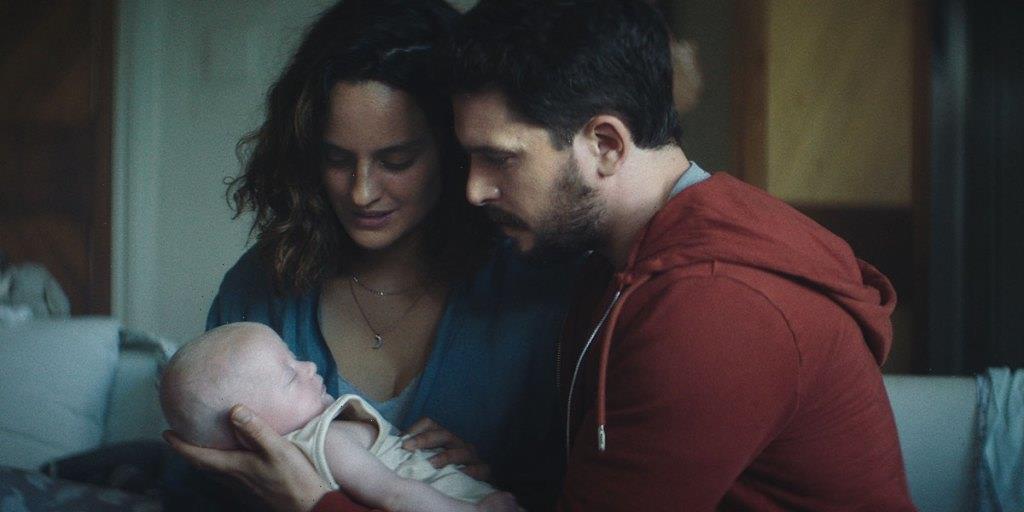“Both mother and baby are doing well,” claim so many birth announcements — an innocuous flash of good news that, in all too many cases, proves to be a bit premature. The baby may be fine after weathering the ordeal of entering the world; the mother might not yet be out of the woods. The strains and vagaries of postpartum depression — still widely misunderstood and even shamed by those who haven’t experienced it — morph into literal horrors in “Baby Ruby,” a stylish and suitably stressful debut feature from Tony-nominated playwright Bess Wohl (“Grand Horizons”). As Wohl rather boldly challenges her audience to maintain belief in, and sympathy for, the anxieties and psychoses tormenting otherwise privileged new mother Josephine (Noémie Merlant), any viewers who waver only prove her larger point.
Evocative and appropriately aggravating as “Baby Ruby” is in its portrayal of mental breakdown following traumatic childbirth, however, its parlaying of this condition into full-blown genre tensions and terrors yields mixed rewards. As we view events mostly through Josephine’s exhausted, increasingly unreliable eyes, our first-hand sense of reality may blur and twist, but our awareness of the likely reason for these distortions saps the film of some uncertainty. That we nonetheless remain emotionally rooted in Josephine’s agonized internal plight is a credit to Merlant, a compelling fusebox of neuroses and contradictions in her second fully English-language role following “Tár,” and the elegant claustrophobia of Wohl’s filmmaking. Here, a mere shift in the light can turn a bucolic upstate idyll into a menacing fairytale forest, with shadows that soak the screen like spilled ink.
Someone who knows the value of the right light is Josephine herself, the founder and chief content creator of a vastly popular lifestyle blog that purports to bring the effortless chicness of Gallic femininity to the American homemaking market. (Her cheese soufflé recipe “broke the internet,” we are told.) A Frenchwoman transplanted to the moneyed pastures of upstate New York, where she’s renovating a gorgeous farmhouse with her artisanal butcher husband Spencer (Kit Harington), she’s ready to hop onto the mommy-blogging bandwagon — documenting and sharing each twee detail of the pastel-perfect baby shower that, Type A influencer that she is, she naturally throws for herself.
Josephine is all too confident that she’s going be a breezily perfect mother — her brand dictates it, after all. Moms who’ve been through it all will likely smirk when she asserts that nothing is going to change all that much. But they’ll fully empathize when, following a brisk cut after she goes into labor, Juan Pablo Ramírez’s camera lingers over the bloody physical aftermath of an evidently difficult birth — with a graphic but not lurid candor that’s rare in cinematic depictions of the experience.
Josephine’s sunny can-do demeanor reverses overnight: Almost immediately she’s plagued by violent hallucinations of worst-case parenting scenarios, her ears incessantly ringing with the sound of Ruby, her newborn, crying. Is Ruby such an Olympic-level bawler or is Josephine imagining the baby’s permanent discontent? For a time, it’s hard to say, though the film’s restless sound design certainly knows the mentally fraying impact of that constant human din. More easily categorized as delusional is Josephine’s insistence that Ruby is angry with her, or that the weeks-old child is exacting that anger with preternaturally grown teeth.
But rational reasoning is no way to reach Josephine, as the adults around her discover one by one — beginning with Spencer, played with commendably unheroic tetchiness by Harington, as his sensitive support gradually sours into parental oneupmanship. His kindly mother Doris (a fine Jayne Atkinson), on the other hand, tries to appease her daughter-in-law with confessions of her own postpartum lows, and only exacerbate Josephine’s spiraling fears in the process. Though she finds an ally in fellow new mother Shelly (Meredith Hagner), Josephine is disconcerted by the apparent Stepford-level serenity of her social circle. This paranoia culminates in the film’s wittiest image, as Josephine runs outdoors with Ruby’s stroller, followed by a horde of pram-pushing joggers who are either chasing her or welcoming her into their mommy-fitness ranks. Perhaps both.
The eventual surrender of Wohl’s script to psychosis allows for an enveloping creep of atmosphere, though it sends the narrative into frantic, tightening circles. A more heated, high-stakes development in Josephine’s friendship with Shelly is one of several script strands left dangling when “Baby Ruby” plunges full-tilt into a realm of kaleidoscopic blackout episodes and double-vision rug-pulling, as editor Jin Lee cannily layers and repeats images to convey the narrowing window of our protagonist’s grasp on reality. Also dropped is Wohl’s pointed early satire, lightly acidic as a chilled white wine, of the lifestyle influencer racket and its dangerous airbrushing of life’s messier obstacles: There’s more to explore in the idea that Josephine is partially a victim of her own exquisite ideals.
Read More About:
Source: Read Full Article





